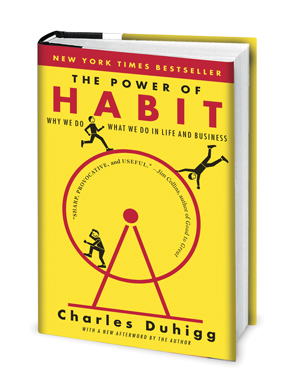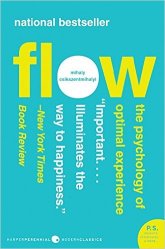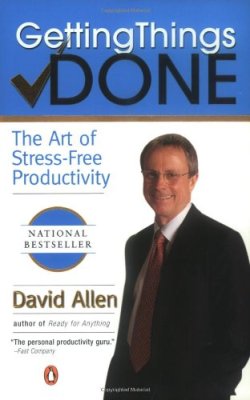Most people wish they were more productive. Some buckle down and leverage some rare facet of their personality to force the work out. Some of them talk with friends. Some go on vision quests. There are lots of methods for lots of types of people. Most hackers, I’ve noticed, look for a datasheet. An engineer’s reference. We want to solve the problem like we solve technical problems.

There were three books that gave me the first hints at how to look objectively at my brain and start to hack on it a little. These were The Power of Habit by Charles Duhigg, Flow By Mihaly Csikszentmihalyi, and Getting Things Done By David Allen.
I sort of wandered into these books in a haphazard path. The first I encountered was The Power of Habit which I found to be a bit of a revelation. It presented the idea of habits as functions in the great computer program that makes up a person. The brain sees that you’re doing a task over and over again and just learns to do it. It keeps optimizing and optimizing this program over time. All a person needs to do is trigger the habit loop and then it will run.
For example: Typing. At first you either take a course or, if your parents left you alone with a computer for hours on end, hunt-and-peck your way to a decent typing speed. It involves a lot of looking down at the keyboard. Eventually you notice that you don’t actually need to look at the keyboard at all. Depending on your stage you may still be “t-h-i-n-k-i-n-g”, mentally placing each letter as you type. However, eventually your brain begins to abstract this away until it has stored, somewhere, a combination of hand movements for every single word or key combination you typically use. It’s only when you have to spell a new word that you fall back on older programs.

But the more revelatory section of “The Power of Habit” is the scope at which habits are involved in daily life. Everything from deep meaningful conversations with a friend to tying shoe laces could be a program written by you or someone in your past. This also means that new habits can be written. A person can intentionally choose a new way of doing things. So the way we express our sentience is not through our everyday lives but how we program ourselves to behave. If we want to stop a bad habit we just need to understand what triggers it and then either avoid those triggers or have them trigger a new piece of code. This was a concept clearly within a hacker’s reach.
Which brings me to the second book. Flow by Mihaly Csikszentmihalyi. Mihaly set out to find what makes people happy. Not the sort of, “I just heard a funny joke,” happy, but the kind where someone describes themselves as content with their lot in the world. Now, this is not a man writing a get-rich-quick self-help book. This is a real scientist publishing a lifetime of research, and he makes a convincing argument. He found a common thread in the way people approach their work. I’m simplifying a great book and a great thesis, but it comes down to gamifying a task and pushing yourself right up to your limit to abstract the tedium away from work and feel a sense of accomplishment.

This also seemed like a positive revelation. Here was an algorithm for work. A way to spread the limited energy left to a single day even further.
The last book was what tied the two disparaging concepts together for me. Getting Things Done: The Art of Stress-Free Productivity is a different sort of book entirely. It’s best described as a productivity formula for the 1980’s power-tie-wearing business person. Most of the concepts are a little dated for the modern workflow, but they can be hammered to fit. However, to me this is a code cookbook. Here is a way a person can apply these concepts of picking new habits, gamifying work, and understanding the underlying principles of doing work to build a system.
In the end these made me feel, at least, like I had the sort of high level understanding of what was going on inside my head. Why did I enjoy some tasks more than others? Why was I more organized and not less on vacations? How does a productive person schedule their day? All these combined into the start of my ability to get real control over my work habits.
I’m far from a master, but I’m making measurable progress. I’m interested to see if any of the readers have had similar revelations or book recommendations.
















This is what you need an AI for, not to organise you, but as a fully functional assclown wrangler and idiot whisperer, to keep them away, so you can do real shit.
I ended up taking a lunch break at 12:30 or 1:00 so I have a golden hour of productivity when “they” (as in everyone else) are out for lunch. I recently took a photo of three people waiting for me to get off the phone… one one level it is annoying, but on the other hand it is also nice to be needed….
I was watching Mad Men the other day and wondering if the efficiency gain from an employee directly typing his/her own notes and projects, working on a computer, is actually lost in not having a secretary as an idiot filter.
There are many ways to ‘program’ a brain (it’s not programming). First to mention auto-suggestion, positive thinking, NLP, psychedelic drugs and many many more.
Physical and mental excercises, meditation, better breathing, lucid dreaming may enhance your brain’s work, too.
Not to forget satisfaction and success.
Does it also raise your chakras’ energy frequency, thetan levels and midichlorian count?
Never forget pure bloody minded stubbornness…. Canute gave up too easy, he shoulda been all “Hell naw! hand me the royal shovel!!!”
Pragmatism, never waste 2 months fruitlessly attempting to come up with an elegant way to avoid banging your head against a brick wall for 6 hours, when you could have just banged your head against a brick wall for 6 hours and got it over and done with.
The organization that I spent the bulk of my career working for was constantly buying into and subjecting the employees to various courses that were supposed to train us into having better work habits and thus being more productive. Generally speaking it was my observation that few were actually changed by these. Good workes remained good workers, poor workers continued to work poorly. The only real change was the buzz-words that would go into circulation for a time. The fact is that those sections blessed with good leadership (note I didn’t write managment) performed well, almost regardless of the caliber of the manpower, and those led by the weak, or idiots, did not, again independent of the quality of the people. The self-employed are almost all quite productive and have learned to work with their strengths and limitations – or they don’t stay in business very long
Yeah, but the constant refrain of “Moar Productivity” starts to wear on you after a while and you start to feel like they don’t really appreciate what you do for them.
This ^
I’d rather have a mountain of incidents fix and updates to code that mattered to someone (ie: impacted users was actually motivated enough to respond, work along side, provide corrective guidance, etc)
than a light load of meaningless tasks that no one looks at when done, can be bluffed away/shrugged off with lame excuses status meeting after status meeting after status meeting. Death by documenting value for the business when no one notices or cares about what you are actually doing.
https://www.youtube.com/watch?v=r8miwsWtzRw
Love the coffee mug on top of the monitor!
Of course. There is far more an organization can do to increase productivity by paying attention to structural issues and workflow optimization than waste time and money on flavor-of-the-month ‘motivational’ bullshit. An occasional clearing out of deadwood doesn’t hurt either in this regard.
Exactly.
Couldn’t have said it better yourself?
I meant to reply to Kestas’ comment on bonuses being the better investment to motivate employees.
Actually there is always more reasonable to give away money for workers as bonuses than spend them on “courses”
There’s a huge industry in talking buzzword-filled pseudo-psychiatric nonsense at management. People with the brass balls to do it with a straight face can make millions. They make more money than managers, and contribute less towards actually producing things. Another failure for whatever-it-is-we-have-now-in-place-of-capitalism.
If their effectiveness was measured objectively, nobody would bother with them. But people don’t work on an objective and rational basis. Which is why we have an enormous advertising estate, pretty much funding the entire Internet. Another failure for whatever people have instead of brains.
Step 1. Stop reading HAD @ work…
Ha, but then you wouldn’t have a reason to get up and go to work each morning.
How did you know? :)
Disparaging concepts or disparate concepts? There’s a pretty big difference :)
One of my favorite life-hack books was the “59-Second Employee”. It was a sarcastic response to the “Minute Manager”, and introduced me to the concept of managing up (ie, managing your manager).
I use my brain like computer. It really works andy you can consciously program everything, even reflexes – fast move from throttle to brake for example. You can detect looping thougts connected with problems you cannot solve at the moment, and you can stop them like frozen application. You can overclock without coffee or other harmful substances, or underclock to withstand discusion with bad people. When i am sad i just shutdown it completely. But i have few problems i need to solve.
My memory sucks, and only thing helping are many “hyperlinks” to trigger-situations i encounter when i need that memory.
I am just bad and slow at math. Extremely stressful and boring. No repair possible.
When i compare my “life energy” with other people it looks like they have nuclear reactors and i have stationary diesel. “Diesel” is better than nothing, though. Mind the turbo, it can boost for some at least slightly enjoyable chores, if you are like this too.
I just imagine everything as technology, its the closest thing for me.
Same too. I find annoying people who instantiate many people I don’t know in a conversation, it fills my RAM.
Pipe to /dev/null
IKWYM. I wouldn’t go as far as “brain is a computer”, but knowing programming helps in a lot of ways, gives you a new way of thinking that most people don’t have access to. It makes, for example, spotting logical inconsistences in a situation easy, they just pop up clear and obvious. Programming is methodical and algebraic. It gives all sorts of advantages to a mind, although I can’t think of any more right now. It’s a compiler, not a database!
It can make it tiring, though, when dealing with people who don’t think logically at all (which is most people). I can figure out how they’re thinking sometimes, but it bothers the arse off me seeing them doing it.
Then there’s politics, or anything else involving people in large masses. That’s just depressing. I can’t see, at all, why people watch those singing idol things on TV. Maybe once or twice, but not dozens of series, over the years, and endless variation also-ran programmes on the same theme. I can see why they make them, but not why anyone would choose to watch. Surely after you’ve seen a series or two run through, the appeal must wear off? Why don’t people think “done that”?
Or TV dramas, or Hollywood films. An emotional rollercoaster, contrived and structured just as much as an actual rollercoaster. Every thrill specified in miles per hour. “Here’s where we’re supposed to feel uncertain, then jubilant, then sympathetic, then outraged”. “Do Androids Dream Of Electric Sheep” has a “mood organ”, akin to a musical instrument, that induces an endless variety of very specific moods. Seems like the same thing.
A book that has influenced my process and workflow is “Smarter, Faster, Better” which also happens to be a Charles Duhigg book. I believe some people referred to it as the logical follow-along to his other work? I may be confusing that with another book, though.
I’ve adopted SMART goals for some of my larger projects, for example. There are other concepts and methods in the book that are more useful for teams, though, so I skimmed those portions.
The War of Art by Steven Pressfield. Here’s the most unoriginal, corny review: “It literally changed my life!”. But it actually did. I’ve encountered productivity tips’n’tricks before, but none of them have had any effect because they didn’t get to the bottom, raison d’etre of procrastination. This book is about that. Deep reasons why a person sabotages himself or herself. Subtle self-destructions. Abstract concept of seemingly superficial laziness. After reading it I actually _understood_ why some things were really, really hard for me – things ordinary like a potato to other people. Note: other things that are incomprehensible to those same people come simple easy to me.
I’d like to suggest Cal Newport’s book “Deep Work” that I recently read. It should probably have been on this list.
I’ve had a few people suggest this book to me. It seems (from what I’ve been told) that it essentially says people ought to find a place away from everything distracting in order to do their best work; sort of like 19th century authors, artists, and scientists would go out to a cabin somewhere for weeks at a time to study.
I read Atomic Habits and right now I am reading GTD. I loved Atomic Habits, I would like to read The Power of Habit.